Unit5 Languages around the world Part 4 reading for writing 课件(20张ppt)
文档属性
| 名称 | Unit5 Languages around the world Part 4 reading for writing 课件(20张ppt) | 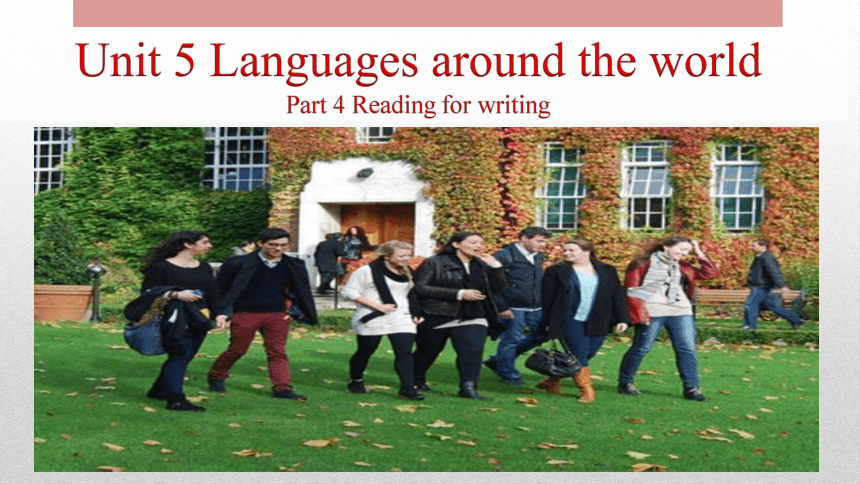 | |
| 格式 | zip | ||
| 文件大小 | 11.6MB | ||
| 资源类型 | 试卷 | ||
| 版本资源 | 人教版(2019) | ||
| 科目 | 英语 | ||
| 更新时间 | 2021-12-05 22:06:46 | ||
图片预览


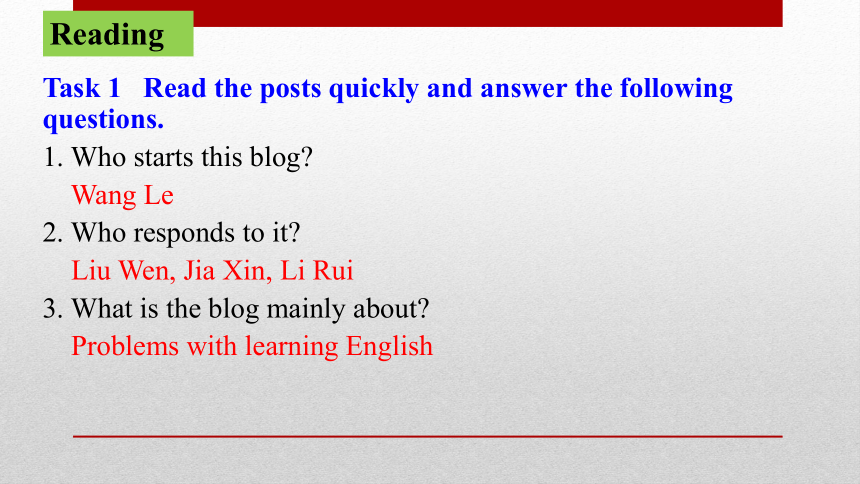
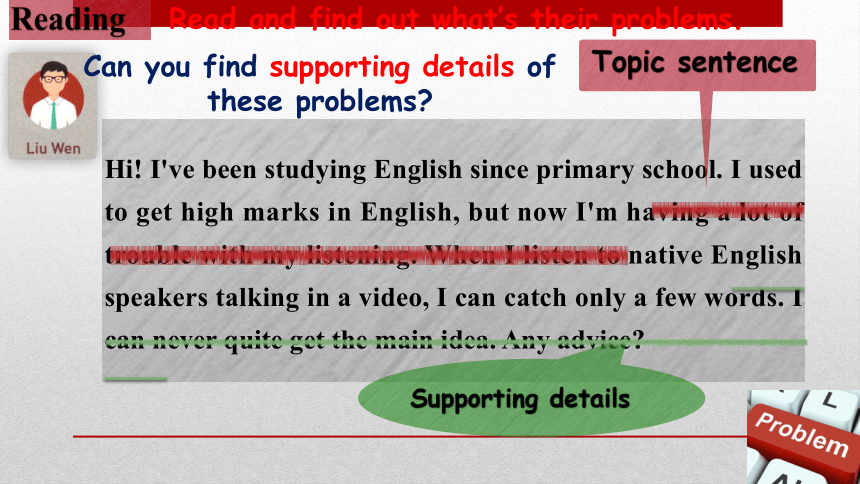
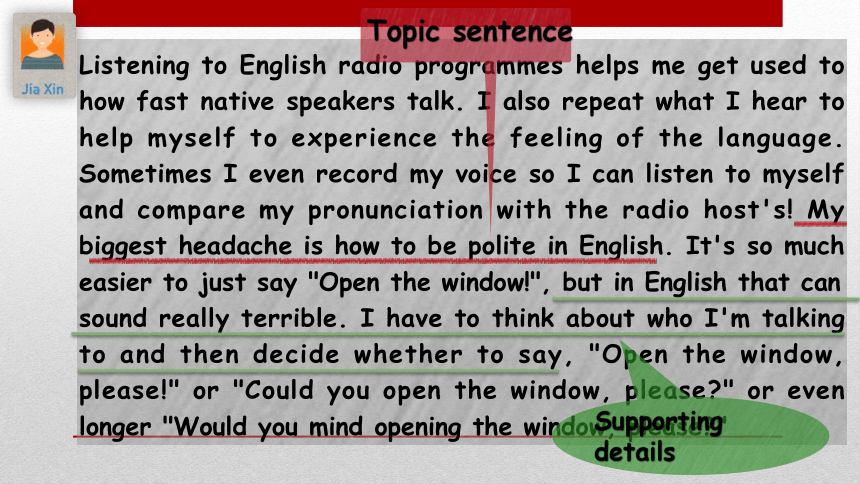
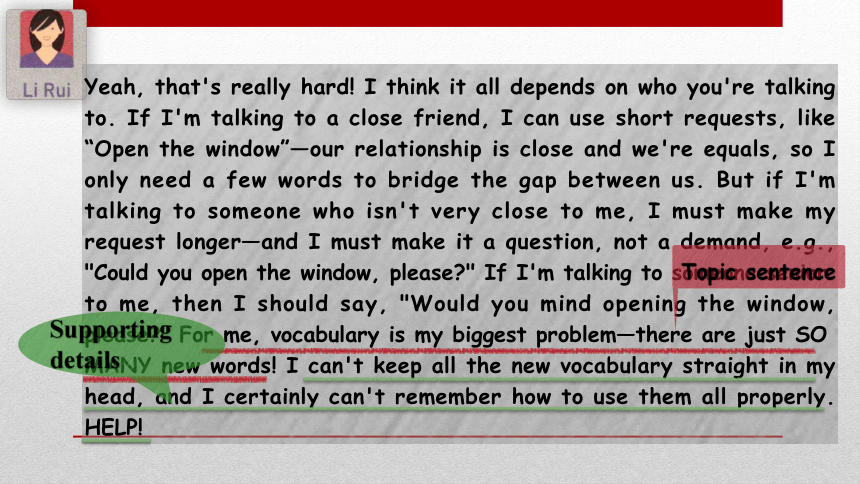
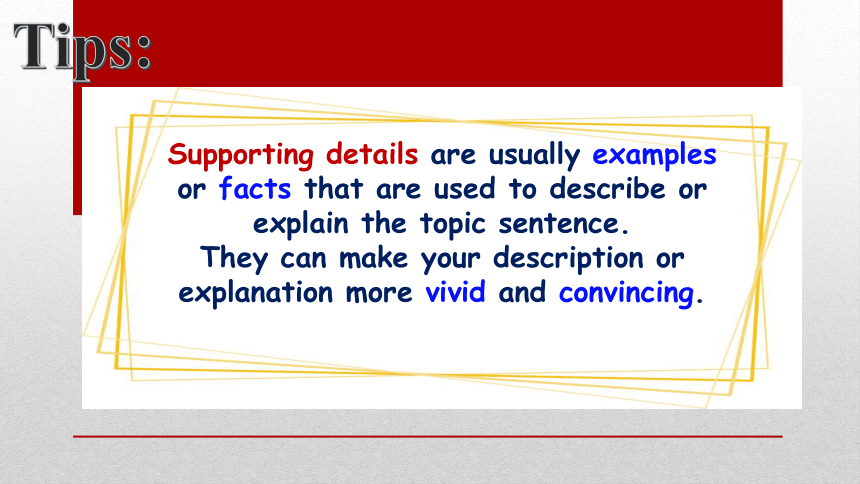
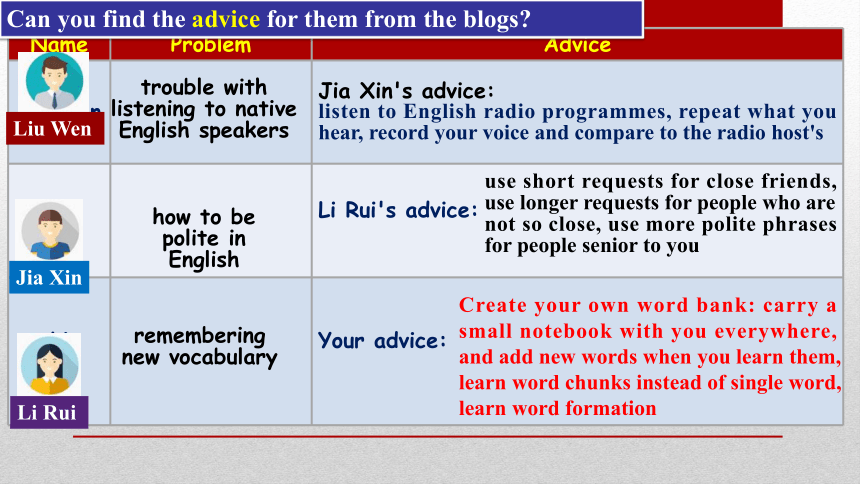
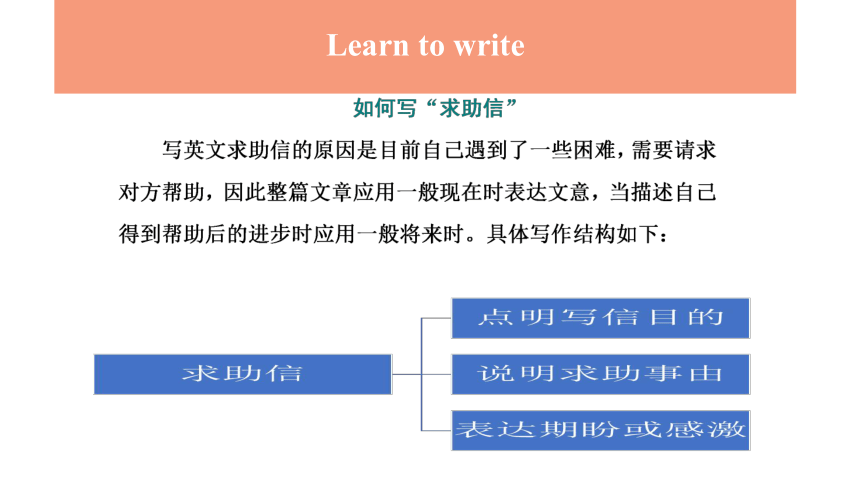
文档简介
(共20张PPT)
Unit 5 Languages around the world
Part 4 Reading for writing
We have learnd a foreign language for many years. Do you know why we learn a foreign language
Task 1 Read the posts quickly and answer the following questions.
1. Who starts this blog
Wang Le
2. Who responds to it
Liu Wen, Jia Xin, Li Rui
3. What is the blog mainly about
Problems with learning English
Reading
Reading
Hi! I've been studying English since primary school. I used to get high marks in English, but now I'm having a lot of trouble with my listening. When I listen to native English speakers talking in a video, I can catch only a few words. I can never quite get the main idea. Any advice
Read and find out what’s their problems.
Supporting details
Topic sentence
Can you find supporting details of
these problems
Listening to English radio programmes helps me get used to how fast native speakers talk. I also repeat what I hear to help myself to experience the feeling of the language. Sometimes I even record my voice so I can listen to myself and compare my pronunciation with the radio host's! My biggest headache is how to be polite in English. It's so much easier to just say "Open the window!", but in English that can sound really terrible. I have to think about who I'm talking to and then decide whether to say, "Open the window, please!" or "Could you open the window, please " or even longer "Would you mind opening the window, please "
Supporting details
Topic sentence
Yeah, that's really hard! I think it all depends on who you're talking to. If I'm talking to a close friend, I can use short requests, like “Open the window”—our relationship is close and we're equals, so I only need a few words to bridge the gap between us. But if I'm talking to someone who isn't very close to me, I must make my request longer—and I must make it a question, not a demand, e.g., "Could you open the window, please " If I'm talking to someone senior to me, then I should say, "Would you mind opening the window, please " For me, vocabulary is my biggest problem—there are just SO MANY new words! I can't keep all the new vocabulary straight in my head, and I certainly can't remember how to use them all properly. HELP!
Supporting details
Topic sentence
Supporting details are usually examples or facts that are used to describe or explain the topic sentence.
They can make your description or explanation more vivid and convincing.
Tips:
Name Problem Advice
Liu Wen Jia Xin's advice:
listen to English radio programmes, repeat what you hear, record your voice and compare to the radio host's
Jia Xin Li Rui's advice:
Li Rui Your advice:
Liu Wen
Jia Xin
Li Rui
trouble with listening to native English speakers
how to be polite in English
use short requests for close friends, use longer requests for people who are not so close, use more polite phrases for people senior to you
remembering new vocabulary
Create your own word bank: carry a small notebook with you everywhere, and add new words when you learn them, learn word chunks instead of single word, learn word formation
Can you find the advice for them from the blogs
Learn to write
求助信
起首句(the opening sentence)
I’m writing to ask you a fovor.
Would you do me a favor
I’m writing to you for some help.
我给您写信是想得到您的帮助。
I’m writing a letter to you to get some help.
我给您写信是为了得到您的帮助。
I have met much difficulty in...在……方面我遇到许多困难。
I don’t know what to do.我不知道该做什么。
结束语 (the closing sentence)
I sincerely hope you can…
I am looking forward to your early reply.
Hope for an early reply
I would be grateful if you could…
I would appreciate it if you could…
你是高一学生李华,英语学习上遇到了困难,写信向Miss Wang寻求建议,要求包含以下内容:
1.单词多,很难记住;
2.课文太长,难以背诵(recite);
3.写作有困难;
4. 听说能力低;
5. 向Miss Wang寻求学习英语的方法。
Writing task
写作指导1: 定框架
体裁
人称
时态
布局
第一、第二人称
求助信(asking for advice)
一般现在时
第一段:写信目的
第二段:描述具体问题
第三段:表达感激
2.要点及补充内容
要点1:我英语学习上遇到了困难,写信向Jenny寻求建议。
要点2:我发现课本单词多,很难记住。
要点3:课文太长,我难以背诵(recite) 。
要点4:写作有困难,语法错误比较多。
要点5:听说能力低,听说考试表现糟糕。
要点6:向Jenny寻求学习英语的方法。
要点7:表达感激。
要点2:我发现课本单词多,很难记住.(定语从句)
I find our textbook full of new words which are very difficult for me to remember.
要点4:写作有困难,语法错误比较多。( have great difficulty in )
I have great difficulty in writing and always make many mistakes in grammar.
要点5:听说能力低,听说考试表现糟糕。 。(do badly in, v-ing作结果状语)
My listening and speaking ability is weak, making me do badly in listening and speaking exams.
写作指导3:遣词造句
Dear Miss Wang,
My name is Li Hua. I'm writing a letter to you to ask for some advice on English learning.
I have met with many difficulties in learning English since I entered senior high school. First of all, I find our textbook full of new words which are very difficult for me to remember. Besides, the texts are too long for me to recite. What's more, I have great difficulty in writing and always make many mistakes in grammar. Last but not least, my listening and speaking ability is weak, making me do badly in listening and speaking exams. I don’t know what to do now. Would you like to introduce me some advice so that I can learn English more easily
I would greatly appreciate your timely help.
Yours,
Li Hua
4. Write the article.
Homework: Write a letter of asking for help
假设你是高一学生李华,正在忙着备战 期末考试,但是发现很难集中精力学习,请给你的英国朋友Alex写一封邮件,向他求助。内容包括:
1.你的困难; 2.寻求帮助。
Possible Version 1
DearAlex,
I'm Li Hua, a Senior 1 student(同位语). Occupied in(非谓语动词) preparing for my final exams, I find it challenging to devote myself to study(句型和短语). Therefore, I'm writing for your assistance(高频词汇).
First of all, though spending(霏微语动词) to much time on homework, I hardly have time to take exercise. Plus, the more I think of the expectation from the teachers and my parents, the more stressedI feel(越...越句型). What troubles me most(主语从句) is that it's a headache for me to fall asleep.
Should you be kind to reply to me promptly, I would be highly appreciated(should 开头的虚拟语气).
Yours,
Lihua
Think you
Unit 5 Languages around the world
Part 4 Reading for writing
We have learnd a foreign language for many years. Do you know why we learn a foreign language
Task 1 Read the posts quickly and answer the following questions.
1. Who starts this blog
Wang Le
2. Who responds to it
Liu Wen, Jia Xin, Li Rui
3. What is the blog mainly about
Problems with learning English
Reading
Reading
Hi! I've been studying English since primary school. I used to get high marks in English, but now I'm having a lot of trouble with my listening. When I listen to native English speakers talking in a video, I can catch only a few words. I can never quite get the main idea. Any advice
Read and find out what’s their problems.
Supporting details
Topic sentence
Can you find supporting details of
these problems
Listening to English radio programmes helps me get used to how fast native speakers talk. I also repeat what I hear to help myself to experience the feeling of the language. Sometimes I even record my voice so I can listen to myself and compare my pronunciation with the radio host's! My biggest headache is how to be polite in English. It's so much easier to just say "Open the window!", but in English that can sound really terrible. I have to think about who I'm talking to and then decide whether to say, "Open the window, please!" or "Could you open the window, please " or even longer "Would you mind opening the window, please "
Supporting details
Topic sentence
Yeah, that's really hard! I think it all depends on who you're talking to. If I'm talking to a close friend, I can use short requests, like “Open the window”—our relationship is close and we're equals, so I only need a few words to bridge the gap between us. But if I'm talking to someone who isn't very close to me, I must make my request longer—and I must make it a question, not a demand, e.g., "Could you open the window, please " If I'm talking to someone senior to me, then I should say, "Would you mind opening the window, please " For me, vocabulary is my biggest problem—there are just SO MANY new words! I can't keep all the new vocabulary straight in my head, and I certainly can't remember how to use them all properly. HELP!
Supporting details
Topic sentence
Supporting details are usually examples or facts that are used to describe or explain the topic sentence.
They can make your description or explanation more vivid and convincing.
Tips:
Name Problem Advice
Liu Wen Jia Xin's advice:
listen to English radio programmes, repeat what you hear, record your voice and compare to the radio host's
Jia Xin Li Rui's advice:
Li Rui Your advice:
Liu Wen
Jia Xin
Li Rui
trouble with listening to native English speakers
how to be polite in English
use short requests for close friends, use longer requests for people who are not so close, use more polite phrases for people senior to you
remembering new vocabulary
Create your own word bank: carry a small notebook with you everywhere, and add new words when you learn them, learn word chunks instead of single word, learn word formation
Can you find the advice for them from the blogs
Learn to write
求助信
起首句(the opening sentence)
I’m writing to ask you a fovor.
Would you do me a favor
I’m writing to you for some help.
我给您写信是想得到您的帮助。
I’m writing a letter to you to get some help.
我给您写信是为了得到您的帮助。
I have met much difficulty in...在……方面我遇到许多困难。
I don’t know what to do.我不知道该做什么。
结束语 (the closing sentence)
I sincerely hope you can…
I am looking forward to your early reply.
Hope for an early reply
I would be grateful if you could…
I would appreciate it if you could…
你是高一学生李华,英语学习上遇到了困难,写信向Miss Wang寻求建议,要求包含以下内容:
1.单词多,很难记住;
2.课文太长,难以背诵(recite);
3.写作有困难;
4. 听说能力低;
5. 向Miss Wang寻求学习英语的方法。
Writing task
写作指导1: 定框架
体裁
人称
时态
布局
第一、第二人称
求助信(asking for advice)
一般现在时
第一段:写信目的
第二段:描述具体问题
第三段:表达感激
2.要点及补充内容
要点1:我英语学习上遇到了困难,写信向Jenny寻求建议。
要点2:我发现课本单词多,很难记住。
要点3:课文太长,我难以背诵(recite) 。
要点4:写作有困难,语法错误比较多。
要点5:听说能力低,听说考试表现糟糕。
要点6:向Jenny寻求学习英语的方法。
要点7:表达感激。
要点2:我发现课本单词多,很难记住.(定语从句)
I find our textbook full of new words which are very difficult for me to remember.
要点4:写作有困难,语法错误比较多。( have great difficulty in )
I have great difficulty in writing and always make many mistakes in grammar.
要点5:听说能力低,听说考试表现糟糕。 。(do badly in, v-ing作结果状语)
My listening and speaking ability is weak, making me do badly in listening and speaking exams.
写作指导3:遣词造句
Dear Miss Wang,
My name is Li Hua. I'm writing a letter to you to ask for some advice on English learning.
I have met with many difficulties in learning English since I entered senior high school. First of all, I find our textbook full of new words which are very difficult for me to remember. Besides, the texts are too long for me to recite. What's more, I have great difficulty in writing and always make many mistakes in grammar. Last but not least, my listening and speaking ability is weak, making me do badly in listening and speaking exams. I don’t know what to do now. Would you like to introduce me some advice so that I can learn English more easily
I would greatly appreciate your timely help.
Yours,
Li Hua
4. Write the article.
Homework: Write a letter of asking for help
假设你是高一学生李华,正在忙着备战 期末考试,但是发现很难集中精力学习,请给你的英国朋友Alex写一封邮件,向他求助。内容包括:
1.你的困难; 2.寻求帮助。
Possible Version 1
DearAlex,
I'm Li Hua, a Senior 1 student(同位语). Occupied in(非谓语动词) preparing for my final exams, I find it challenging to devote myself to study(句型和短语). Therefore, I'm writing for your assistance(高频词汇).
First of all, though spending(霏微语动词) to much time on homework, I hardly have time to take exercise. Plus, the more I think of the expectation from the teachers and my parents, the more stressedI feel(越...越句型). What troubles me most(主语从句) is that it's a headache for me to fall asleep.
Should you be kind to reply to me promptly, I would be highly appreciated(should 开头的虚拟语气).
Yours,
Lihua
Think you
